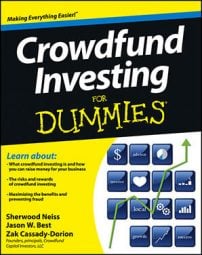Many new small businesses can’t secure bank loans. That’s always been the case, and it’s become even more difficult since 2008. Banks require security for their loans and, in most cases, want to see two different ways that a business owner can repay them. (They want a backup plan in case Plan A doesn’t pan out — if sales or revenues are lower than expected, for example.)
When you’re starting a new business, you (and your partners, if you have them) invest everything you’ve got — financially, physically, and emotionally — into getting your business off the ground. You may not have a Plan B, which means you may not qualify for a bank loan.
What about venture capital or private equity? Well, if you live in the San Francisco Bay Area; Austin; New York City; Washington, D.C.; or Boston, you may be in luck. High concentrations of private capital investors operate in these areas and are looking for great ideas to invest in.
Geography is on your side because these investors may be looking to invest locally or may simply be more apt to meet with someone whose business is in town (versus halfway across the continent). If you live in Natchitoches, Louisiana, or Arnold, Nebraska, your access to these investors may be more limited.
In addition, if you’re starting or running a company in an industry that isn’t hot or new, you probably won’t grab the attention of private equity firms even if you live in one of the investment hot spots. (Private capital investors generally don’t put money into dry cleaning chains or sports bars unless you have a way to generate 10- or 20-fold returns in less than five years.)
And just in case you aren’t discouraged enough, venture capital investors and angel investors are increasingly moving away from what used to be considered “seed-stage investments” and taking a more wait-and-see approach before parting with their money. They now tend to watch an entrepreneur bootstrap his business until he has real deliverables or traction.
For example, they want the entrepreneur to build a prototype, launch the service or product, sign a certain number of customers, or maybe even get to break even on a cash flow basis before they’re willing to invest. If you’ve ever started a business, you know that these milestones are big, and reaching them on your own is no easy task.
If you have a legal and legitimate business or idea, just because you haven’t been able to qualify for traditional financing doesn’t necessarily mean your business or idea can’t work. Turning to crowdfund investing may provide you an opportunity to raise the money you need to get the proof that you can achieve milestones, create a track record, and demonstrate to investors or banks that they should work with you.

